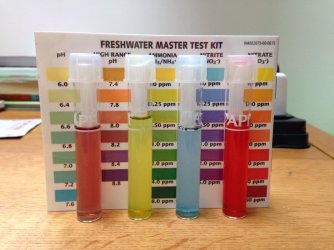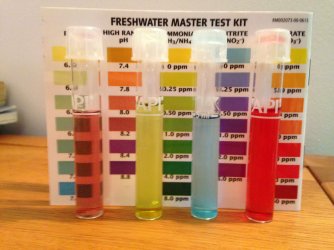djohnson1974
New Member
- Joined
- Dec 26, 2016
- Messages
- 25
- Reaction score
- 1
Helllo All,
I am new to fish keeping and new to the forum. I am in the process of setting up a new 125l jewel rio tank and need some advice please.
I set the tank up with water and substrate and let it run for a week to make sure everything was working then introduced 4 guppies and 2 platys to carry out a cycle.
I've checked the water everyday with an API master kit and carried out a 10% pwc every other day. I am feeding every other day too.
I have introduced some river cobbles to the tank and added a cirax basket to the filter system over the course of the 2 weeks.
My issue is that the test readings have remained static giving the readings as shown on the attached image so I'm not even sure my cycle has started.
What should I do next? Advice greatly appreciated.
I am new to fish keeping and new to the forum. I am in the process of setting up a new 125l jewel rio tank and need some advice please.
I set the tank up with water and substrate and let it run for a week to make sure everything was working then introduced 4 guppies and 2 platys to carry out a cycle.
I've checked the water everyday with an API master kit and carried out a 10% pwc every other day. I am feeding every other day too.
I have introduced some river cobbles to the tank and added a cirax basket to the filter system over the course of the 2 weeks.
My issue is that the test readings have remained static giving the readings as shown on the attached image so I'm not even sure my cycle has started.
What should I do next? Advice greatly appreciated.



